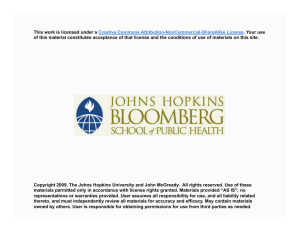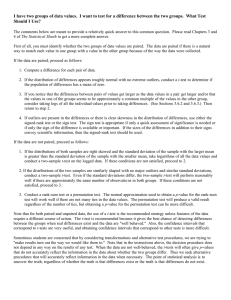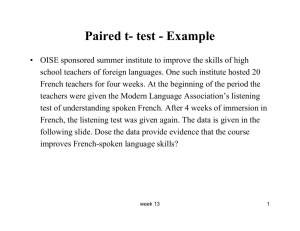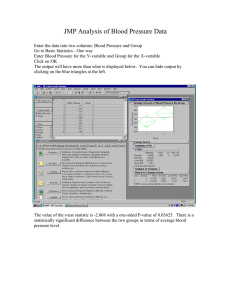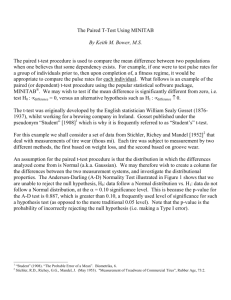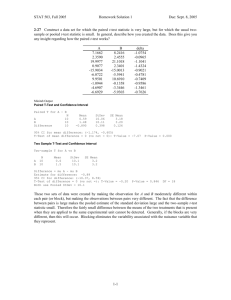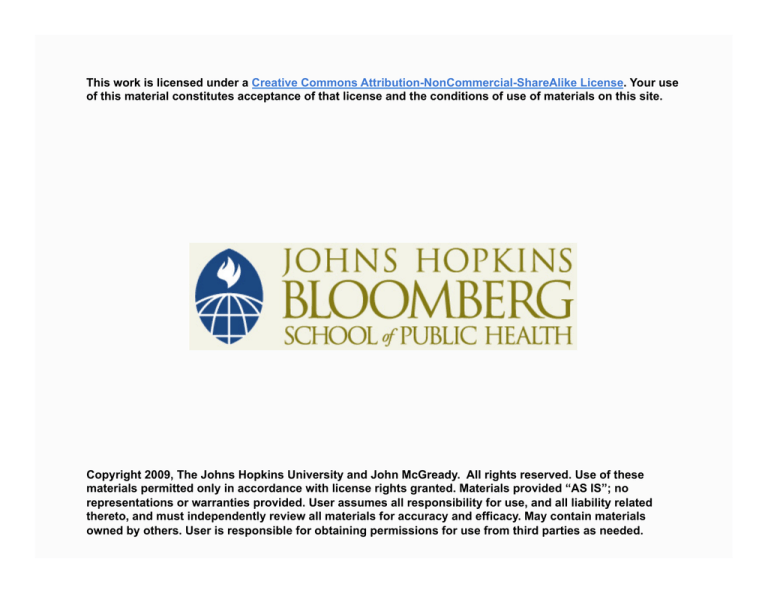
This work is licensed under a Creative Commons Attribution-NonCommercial-ShareAlike License. Your use
of this material constitutes acceptance of that license and the conditions of use of materials on this site.
Copyright 2009, The Johns Hopkins University and John McGready. All rights reserved. Use of these
materials permitted only in accordance with license rights granted. Materials provided “AS IS”; no
representations or warranties provided. User assumes all responsibility for use, and all liability related
thereto, and must independently review all materials for accuracy and efficacy. May contain materials
owned by others. User is responsible for obtaining permissions for use from third parties as needed.
Lecture 4c: Practice Problems
John McGready
Johns Hopkins University
Practice: Paired t-test
1. Eight counties were selected from State A
- Each of these counties was matched with a county from State B,
based on the following factors:
Mean income
Percentage of residents living below the poverty level
Violent crime rate
Infant Mortality Rate (IMR) in 2006
Information on the infant mortality rate in 2007 was
collected on each set of eight counties
IMR is measured in deaths per 10,000 live births
A pre- and post-neonatal care program was implemented
in State B at the beginning of 2007
3
Practice: Paired t-test
1. This data is being used to compare the IMR rates in States A and B
in 1997
- This comparison will be used as part of the evaluation of the
neonatal care program in State B, regarding its effectiveness on
reducing infant mortality
4
Practice: Paired t-test
1. The data is as follows:
Pair
IMR: State A
IMR: State B
Difference (A - B)
1
80
76
4
2
130
112
18
3
88
97
-9
4
98
67
31
5
103
107
-4
6
121
116
5
7
83
94
-11
8
93
78
15
Mean
99.5
93.4
6.1
SD
17.9
18.1
14.5
5
Practice: Paired t-test
1. What is the appropriate method for testing whether the mean IMR
is the same for both states in 2007?
- Estimate a 95% confidence for the true difference in mean IMR
between the two state groupings
- State your null and alternative hypotheses for the corresponding
hypothesis test
- Report a p-value for the hypothesis test
- Do the results from the 95% confidence level and the p-value
agree in terms of the null hypothesis (using α=.05 for the
hypothesis test)?
- What would your results be for A - D if you had 32 county pairs,
and the mean difference and standard deviation of the
difference were the same?
6
Practice: Paired t-test
2. What is the role of the α-level in hypothesis testing?
3. What is the role of the p-value in hypothesis testing?
4. Which of the following quantities depend on data in a paired t-test
situation?
- The true mean difference
- The p-value
- The estimated standard error of the sample mean difference
- The α-level of the test
- The sample mean difference
7
Practice: Paired t-test
5. Seventy individuals were enrolled in a dietary counseling program
intended to promote healthier eating. Each subject had his/her
sodium levels measured on the day of enrollment, and after two
weeks of counseling. The results of these measurements were as
follows:
x pre = 17.7 mEq/8hr
x post = 16.5 mEq / 8hr
s differences = 12.2 mEq/8hr
Was the change in average sodium excretion statistically significant
at the .05 level? Justify your answer numerically.
8



